Job Sites Online
Follow Me on Twitter, LinkedIn
View Count: 6323




 (No Ratings Yet)
(No Ratings Yet)Here is a list of job search sites to help you with whatever type of job search you may be doing:
List of job search sites
In addition, I’ve also added what I feel are some good job search resources (including employers) from different industries to this list as well.
However, because new job sites are launched just about every day it is important you know how to find these sites on your own without using this list of job sites I have put together for you.
I want you to think back to thirty years ago, before the Internet changed the face of the job search, when newspapers in every small and large town in America had job postings. For job searchers, this was the primary source of job listings and the job listings were the primary source of a newspaper’s advertising revenue.
Contents |
Back in the late 1990s when a lot of people started using the Internet, job boards started popping up. The idea was that there was no cost for employers to post because it was just electronic. It was online, after all. By putting the job online, it reduced the cost of advertising and printing because there was no printing and distribution of the newspaper involved. In addition, it opened the jobs to a much larger market. As the job postings migrated to these online sites, it affected the newspaper industry negatively.
Due to a lack of readership and ad revenue, print newspapers across the country are going out of business. In the realm of career postings, job sites have taken over the market. You simply cannot afford to do any job search without having a thorough understanding of job sites.
Interestingly enough, unless you are looking for a job with a print newspaper, this is good news for you. The number of job sites out there is astronomical, and the more websites you look at in your job search, the more opportunities you will find. The total number is probably about forty thousand job sites, but I’d estimate there are ten thousand decent ones. Obviously, that many job sites also presents a problem. How can you possibly review that many sites? Plus, with the sites being so ubiquitous, you might find you have lots and lots of competition for just one position.
The first movers in this space came along and they set up job boards. The larger ones—CareerBuilder, Monster, and Hot Jobs—historically had the most jobs. These job sites followed the model of newspapers: Charge employers to post jobs.
In the newspaper world, the more circulation a newspaper has the more it can charge for its classified advertising. Therefore, early entrants into the job board space sought to get as many job seekers as possible to their sites so they could charge higher rates to advertisers posting jobs. Accordingly, these sites did (and continue to do) massive amounts of advertising to attract as many applicants as possible to their jobs.
While having lots of traffic benefits the job sites and employers, it should be pretty obvious that this also makes it much more difficult for you to get a job when you are on these sites. For example, it is not uncommon for an employer to receive upwards of 1,000 applications when they post a job on a site like CareerBuilder. The drawback of the larger job sites is that the employers typically receive incredible numbers of applications. The job of the larger site is to promote the employer’s openings, so you will see ads during the Super Bowl, on buses, on television, and so on. There are many places where these sites advertise with the goal of driving lots of applications.
In addition, because there is very little filtering of these applications, the employer may not even get the sorts of applications they need. Many people will indiscriminately apply for jobs for which they are not qualified. For example, it is common for people such as dishwashers to apply for attorney jobs on these sorts of sites.
In addition to these “mega sites,” there are tens of thousands of smaller sites. These smaller sites typically do not receive a lot of applications. Because these smaller sites have less competition for the jobs, it is often much easier for you to get the position you want. There are numerous smaller sites for niche sorts of jobs. For example, there are sites for different types of engineers, job sites for attorneys, job sites for accountants, and so forth. Because they do not receive a lot of applications, they are generally a good way to track down jobs where the competition isn’t quite as fierce.
Because there are so many job sites, you have to think of who is constantly looking for employees. Historically, recruiters have been the ones looking for the most people. They are always searching for different types of employees and the larger the recruiting firm, the more likely it is that they will consistently have openings for certain types of people. Recruiters always advertise and they tend to have the most jobs on job boards. This is an important thing for you to understand.
Recruiting firms generally also get special “preferential rates” with job sites. While it may cost an employer $500 to put a single advertisement on a site like Monster, a recruiting firm may be able to purchase “packages” of jobs, which lower its cost to post each job to around $75. Recruiters may also have “slots” with a job site, which they need to use at all times. This means the recruiter may be forced to advertise its jobs whether or not it has openings that it is actively looking to fill.
Therefore, it is important to be somewhat suspect of the jobs you see advertised online for recruiting firms.
It is also important to remember that a recruiter is a middleman. When you apply to a recruiter job, you are not applying to the employer. You are applying to someone who will screen your résumé and who may or may not submit it for a particular job.
There is a final factor, which is important to understand. Recruiters charge employers fees that are a percentage of your annual salary and can be as high as 40 percent to maybe 15 percent for low-level administrative positions. If the employer hires you, they are charged this fee. Obviously, this can potentially prevent you from being hired unless you are extremely well qualified for the position. It is important to understand that using a recruiter can help you tremendously for many positions regardless of the fee. For example, many recruiters have very close relationships with various employers. In addition, a large extremely successful business will almost never care whether there is a recruiting fee involved when it hires you. Successful businesses simply want the best people and are unconcerned whether or not there is a recruiting fee. Nevertheless, a recruiting fee can put off many smaller businesses and unsuccessful businesses.
There are also issues of credibility with certain recruiters. Some recruiters are simply not trusted by employers and may have bad reputations with employers. This means that using a recruiter could hurt and not help you when you are involved in a job search.
The main thing I want you to be aware of is that applying to a job through a recruiter — and most job sites are littered with recruiter jobs — is putting you in a position of not knowing exactly what will happen. It’s important to be aware of this as you send out applications.
With 40,000+ job sites, the main issue is finding the sites you should be using—and there are tons and tons of methods for finding them. There are many small sites that typically have relationships with certain employers, which is good.
For example, a small job site for people in the medical device industry may have very close relationships with various manufacturers of medical devices. These manufacturers will be very comfortable posting jobs on this site due to the fact that the job site has developed a close relationship with them and is able to provide them a steady stream of candidates. Therefore, when you go to this job site for medical device professionals, you will see some excellent jobs that match your interests. In addition, the jobs you see on this site for medical device professionals likely won’t be advertised on other job sites. If you are in the medical device industry and looking for a job, you would be well served looking at this specific site.
With these sites, it is important that you understand there are lots and lots of very specific job sites for different careers. Then there are larger sites. There are many sites out there and you really need to look at a lot of different ones in order to find jobs. Confining your search to a few large legal sites is not a good idea. It is very important that you are also searching niche sites for your profession for jobs.
A good way to track down job sites for your profession is by using online directories. Let’s look at some specifics.
DMOZ. One of the most popular directories is DMOZ.org. This is a great way to find various job sites.
One of the easiest ways to search this directory is to simply follow the steps below.
1. Go to http://www.dmoz.org, then click the “jobs” link above. This takes you to the screen for the URL www.dmoz.org/business/employment/.
2. Once you are there, I would recommend clicking on the URL for Industry:
3. This takes you to this URL http://www.dmoz.org/Business/Employment/By_Industry/ that shows you a ton of various links categorized by industry for different types of jobs. Once you have done this, you should choose an industry. In the example below, I clicked the law industry.
4. The screen that opens up when you click on an industry-specific search http://www.dmoz.org/Society/Law/Employment/ (like I did for law) then gives you the option of looking at job listings, seeing legal recruiters, and so forth. To find job sites, just click on job listings:
5. This then takes you to the page www.dmoz.org/Society/Law/Employment/Job_Listings/ that shows you all of the job sites in a given industry:
DMOZ is a good directory and a trustworthy source of information. Nevertheless, because sites need to be manually submitted and reviewed by editors, not every site will be included in the directory. Due to this, the job sites that end up getting included tend to be high quality.
Yahoo. The Yahoo! Directory is also very good. We can go to “Yahoo directory job sites.” You can see that they have different things to tell you about job listings here, too. I would check that out.
Here are some of the steps and screens you would follow to find job sites that specialize in sales, for example:
- Go to Dir.Yahoo.com
Click on “Jobs” under the “Business/Economy” link on the home page:
2. Click on “Careers and Jobs,” on this page:
http://dir.yahoo.com/Business_and_Economy/Employment_and_Work/.
3. Click on “Jobs,” on this page: http://dir.yahoo.com/Business_and_Economy/Employment_and_Work/Careers_and_Jobs/.
4. Click on “Career Specific,” on this page: http://dir.yahoo.com/Business_and_Economy/Employment_and_Work/Careers_and_Jobs/Jobs/
5. Click on the industry that most closely matches what you are seeking. Here, I clicked on “Marketing and Advertising,” since it seemed closest to “sales” on this page: http://dir.yahoo.com/Business_and_Economy/Employment_and_Work/Careers_and_Jobs/Jobs/Career_Specific/
6. You will be then take to this page which shows the sites for you to search through:
These are just two directories. There are literally hundreds of directories out there.
It is useful to use these directories to search for job sites because the information is all organized in one place. Because not all directories have all of the job sites, it is often a very good idea to search more than one directory for job sites in your profession. Whatever your profession is, the chances are quite good there are numerous different job sites.
One thing you may be asking is why not just make a normal search for jobs in your profession on a search engine like Google, for example, instead of using a directory. This is certainly an option. Nevertheless, you need to understand that the way a search engine ranks different searches is extremely complicated. Therefore, if you rely on search engines and not directories you may never find the job site you are looking for. For example, in terms of optimizing their site for search engines, many job sites have no idea what they are doing. Despite this fact, the site may have very good jobs. It is important, therefore, to supplement your search for job sites with directories.
I’d like to take a minute to share with you my suggestion of a really good job board that I highly recommend for all professions. Granted.com was designed by my company to take your job search to the next level. More than a year in the making, it gives job seekers free access to thousands of jobs from as many websites and companies. Newspapers, employer websites, job boards, and other sources are included in Granted‘s database.
The site covers all major job industries and allows you to upload your resume or resumes and apply to many employers directly, simplifying the process of your job search.
Below are some pictures of Granted.com‘s home page along with a few other pages you will see on the site.
Granted categorizes jobs by industry and by location.
Granted lets you upload your resume or resumes, import your profile from LinkedIn, or even create your own resume to submit to employers.
Granted can also provide job alerts for a specific search and email them to you automatically, along with several other great features, which is why I highly recommend using it for your job search.
As mentioned earlier, job sites have carried over the same method of charging employers for a classified ad that was practiced with newspapers. There are a couple of things that are also important for you to understand about job sites. Typically, they charge fees. You may find a rare job site that does not, but it is rare (we do charge fees to post jobs on our site www.EmploymentCrossing.com, but we also research jobs from everywhere we can find them, and we always let you know which jobs are paid on our site).
The cost to post a job on a job site can be anywhere from $25 to $500 or more. This means that the jobs you are seeing are only the ones that the employers are paying to post. It also means that the jobs on a site are dependent upon the marketing and sales ability of the job site to sell employers on posting jobs with them for a fee.
I personally think that in terms of your resources, it is good to apply to the jobs on big sites, but you need to understand that by going to large sites you are going to spend a lot of time looking at jobs. Those jobs are getting a lot of applications. In general, smaller sites are going to receive fewer applications.
Privacy really is a major concern with a lot of job sites. I will just go here to Google and type “Monster data breach.”
You can see here that Monster had a theft of confidential information from 1.3 million job-seekers that hackers broke into. So, there are some confidentiality issues you need to be aware of with job sites. I really feel though that people hacking sites like Monster is the least of your concerns. A major concern is identity theft from posting your résumé online. People may steal your identity, which is common and a hassle.
In addition, most job sites market to you and/or make your information available to others. How does that work? Let’s go online here. Here it says “one week $699” to search resumes.
Anybody with an Internet connection can go on and look at your résumé. A résumé will be for sale if you post it there. That is an important thing for you to understand, that your résumé is for sale.
Again, another privacy concern is with recruiters. You do not know what is happening with your résumé. Understand that when you apply for a job through a recruiting firm on a site, you do not know, necessarily, what is going to happen to your résumé. If your privacy is important to you, and it should be, this is something to keep in mind.
In terms of the strategy I recommend:
(1) Apply to all the jobs on the big sites that match what you are seeking to do. Set up job alerts on these sites.
(2) Create a list of small job sites using directories in addition to search engines and apply to all the jobs. Set up job alerts on these sites as well.
It is very important for you to get those job alerts. When you get one, apply as soon as you review the job details. After a few hours, most employers will have received a lot of applications and your application is less likely to get reviewed.
***
I want to tell you a couple of quick stories. I used to use sites like Monster and things like that when our company had jobs. This was before we were in the job search business.
It was absolutely incredible. We still use it to some extent for some jobs, the ones we do not post on our own sites, in order to get huge exposure for a job that is really hard-to-fill. At the same time, I remember in 2001, after the dot-com crash and after September 11th, we had a job for a programmer.
At that point in time, the job market was at an absolute standstill for programmers. We posted a job there and I was literally getting an application every two or three seconds for several days. I had to change my e-mail address because it was so intense.
Now, I think you may be able to prevent the applications from coming to your e-mail address and divert them to some platform within the site. The level of interest received by some jobs is just insane because there are so many people out there.
Many people do not even look to see if they are qualified for the job. You may have a janitor applying for a job as a sophisticated computer programmer and this person has never even turned on a computer. It is important to understand that you need to really be careful, show a lot of respect for the jobs, and know that you are not necessarily going to get the best response from job sites.
Once again, I recommend applying via e-mail and also letter or fax. I have gone into the explanation for this several times, but I want to make sure that you do that. If you have not heard within a few weeks, you should follow up with the employer.
I even recommend that you call. A lot of people say you should not call; it can be offensive to some employers. However, if you have not heard back within a couple of weeks, the odds are pretty good that the employer is not interested in you, so there is nothing really wrong with calling. Generally, an email is fine, too.
In brief, job sites are really an excellent way to track down jobs. The most important thing you can do in terms of my recommendations are to make sure you are aware of all of the sites in your niche in terms of what you do. You should set up job alerts and apply to jobs on large websites.
In addition to applying to jobs on large websites, it is also very important to apply for jobs on smaller websites. Smaller websites are a very good source of jobs because the jobs will not be promoted as much and they will match your niche. Use directories and so forth to set those up.
It is a good idea to make your résumé available on different sites, but be very careful with your identifying information. In this case, you want to make your résumé appear general. Do not give too much personal information. You might even set up a separate e-mail account that you check periodically or even daily. Leave off your home address. You do not want people to see that you are employed who can then go to your house while you are at work.
These are some of the general things. I would do a Google search for guidelines and read the resources. Things change on an ongoing basis, so be careful with that. It does take a lot of time to distribute your résumé to lots and lots of different sites. We have a product called Résumé Boomer that will post your résumé to tons of different websites, so that is an option for you.
You really need to use job sites in your search. Make the most of them. I always think it is a good idea.
Related Articles:
About Harrison Barnes
Harrison Barnes is the Founder of BCG Attorney Search and a successful legal recruiter himself. Harrison is extremely committed to and passionate about the profession of legal placement. His firm BCG Attorney Search has placed thousands of attorneys. BCG Attorney Search works with attorneys to dramatically improve their careers by leaving no stone unturned in a search and bringing out the very best in them. Harrison has placed the leaders of the nation’s top law firms, and countless associates who have gone on to lead the nation’s top law firms. There are very few firms Harrison has not made placements with. Harrison’s writings about attorney careers and placements attract millions of reads each year. He coaches and consults with law firms about how to dramatically improve their recruiting and retention efforts. His company LawCrossing has been ranked on the Inc. 500 twice. For more information, please visit Harrison Barnes’ bio.
About BCG Attorney Search
BCG Attorney Search matches attorneys and law firms with unparalleled expertise and drive that gets results. Known globally for its success in locating and placing attorneys in law firms of all sizes, BCG Attorney Search has placed thousands of attorneys in law firms in thousands of different law firms around the country. Unlike other legal placement firms, BCG Attorney Search brings massive resources of over 150 employees to its placement efforts locating positions and opportunities that its competitors simply cannot. Every legal recruiter at BCG Attorney Search is a former successful attorney who attended a top law school, worked in top law firms and brought massive drive and commitment to their work. BCG Attorney Search legal recruiters take your legal career seriously and understand attorneys. For more information, please visit www.BCGSearch.com.
Filed Under : Featured, Finding a Job
Tagged: career advice, career postings, find job sites, job listings, job seekers, job sites for accountants, job sites for attorneys, legal recruiters, legal sites, list of job search sites and how to find job sites, list of job sites, yahoo directory job sites

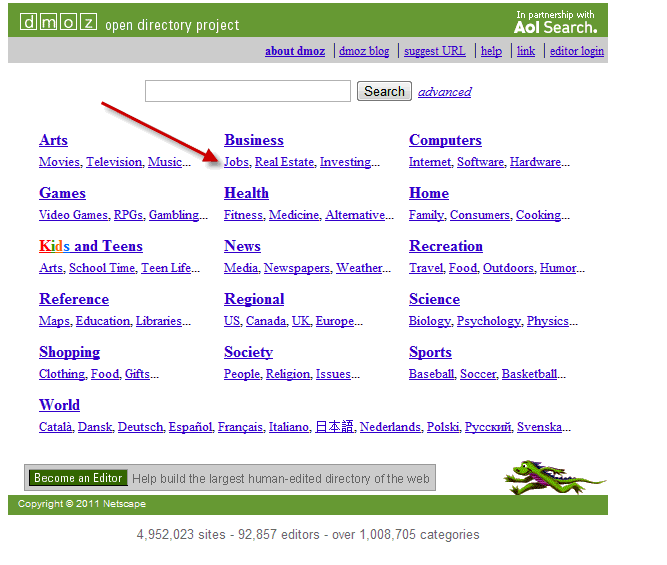
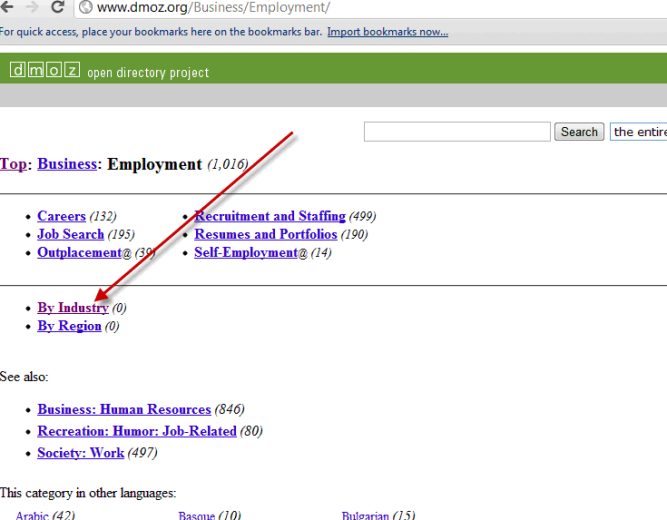
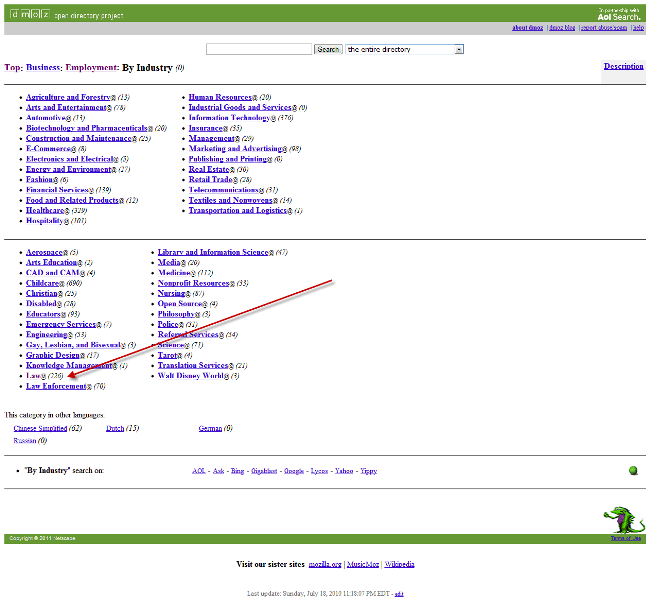
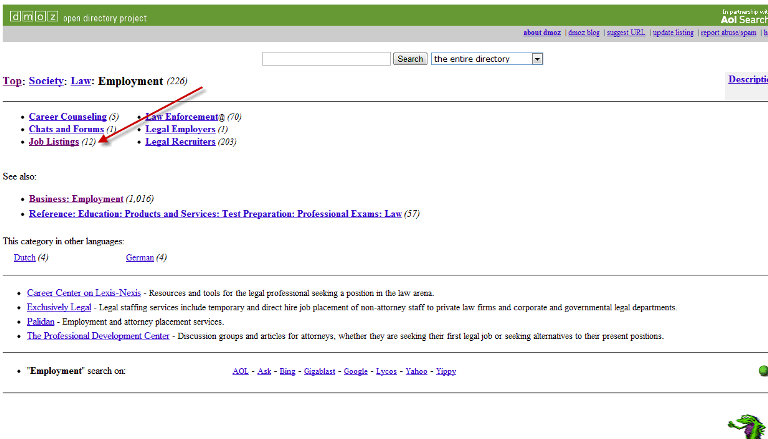
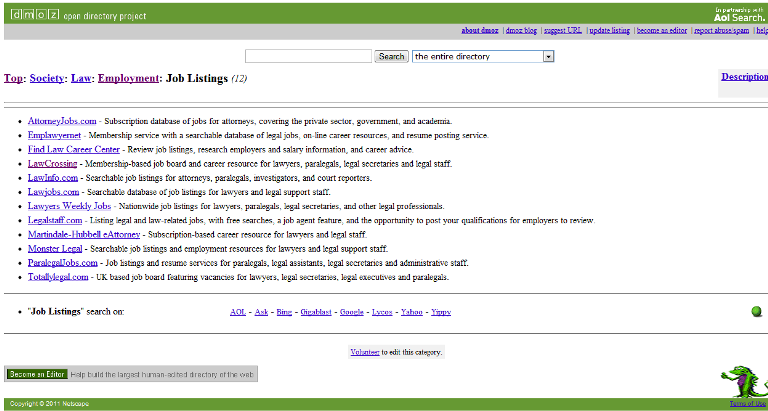
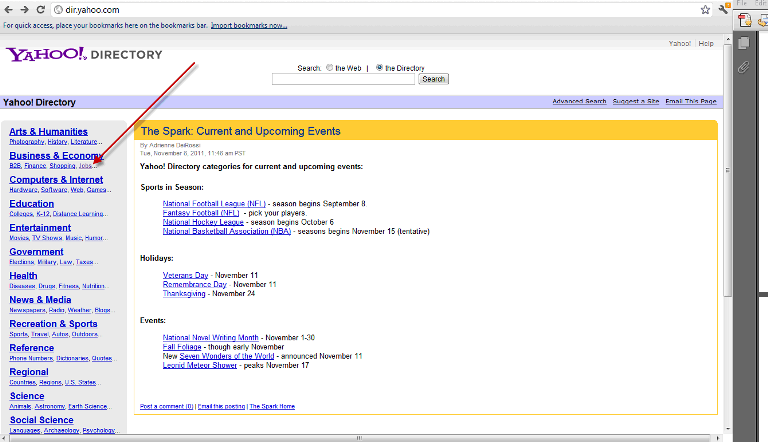
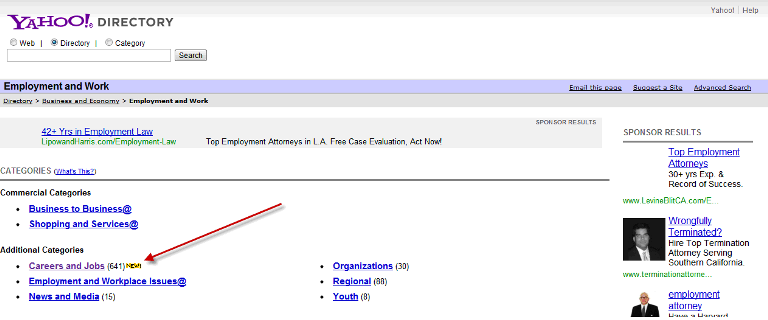
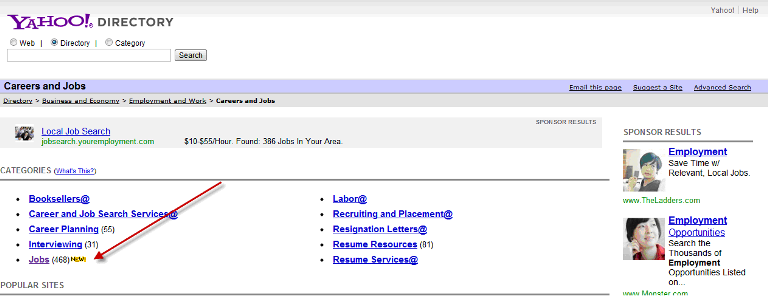
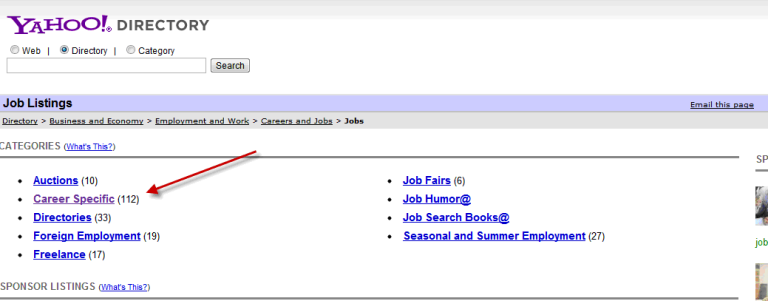
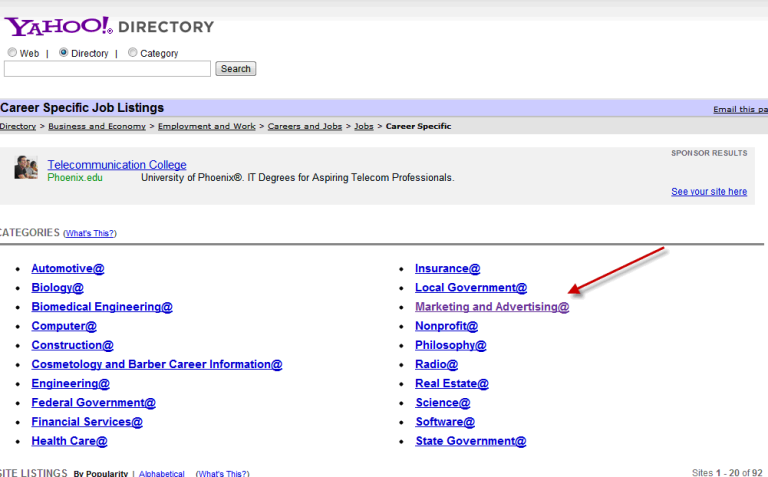
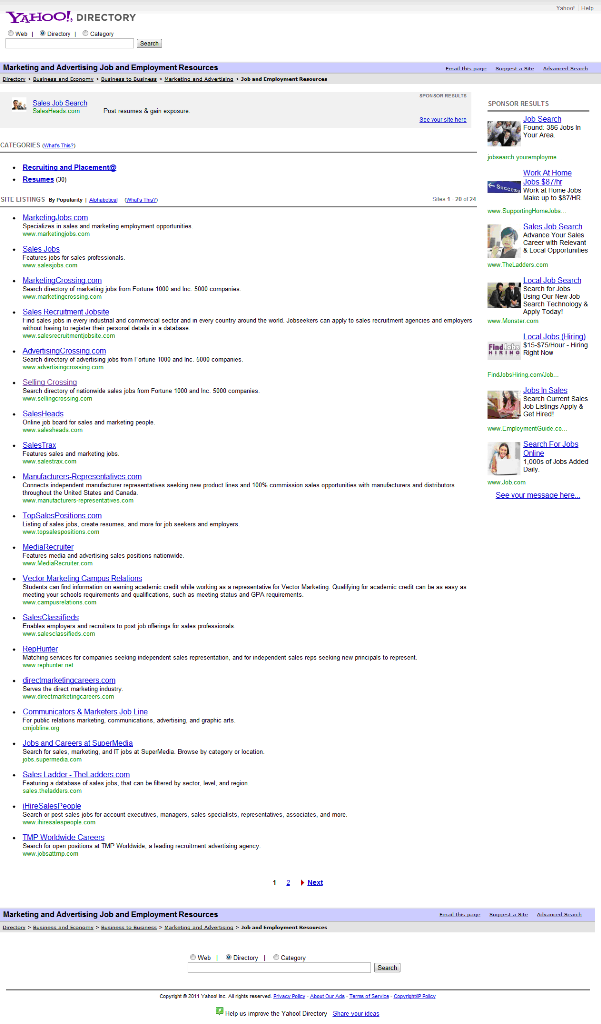
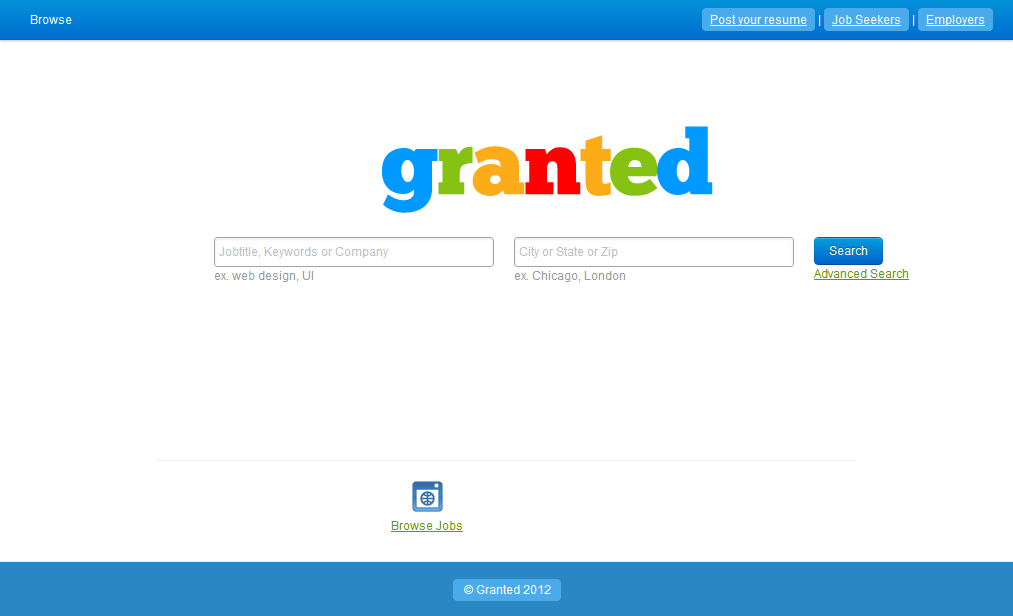

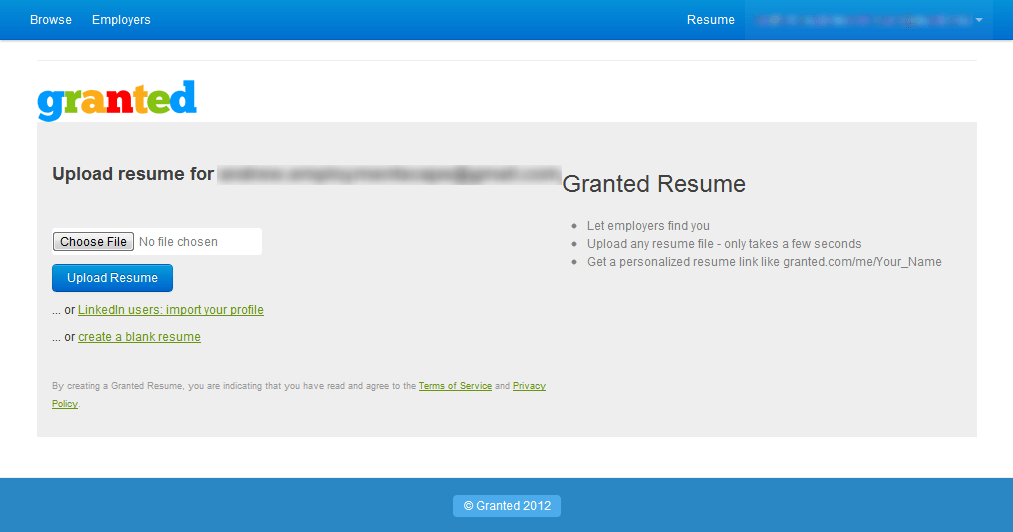
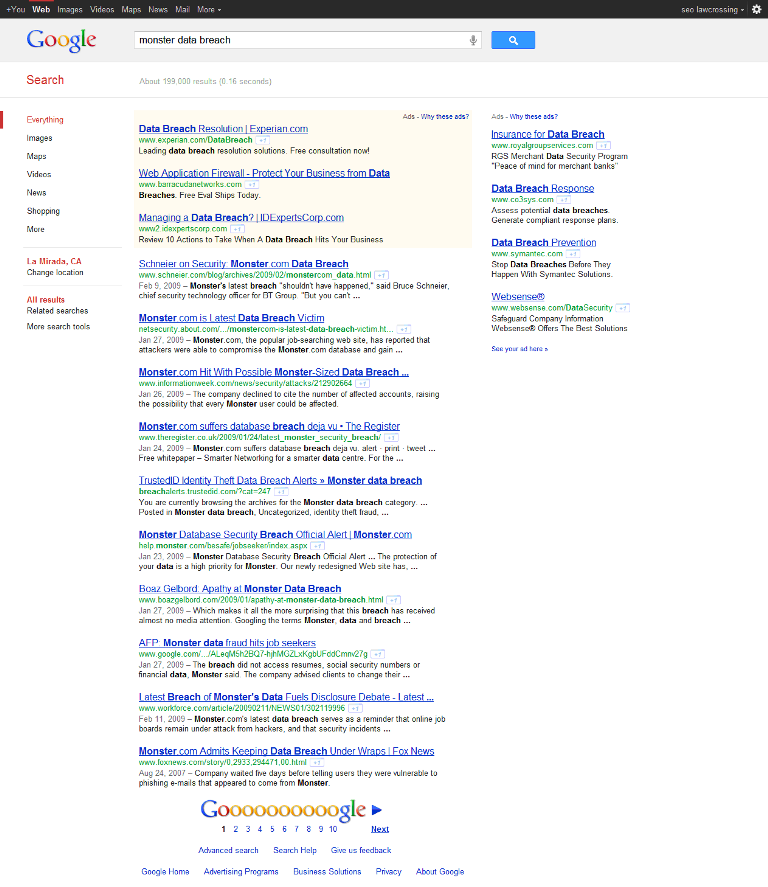
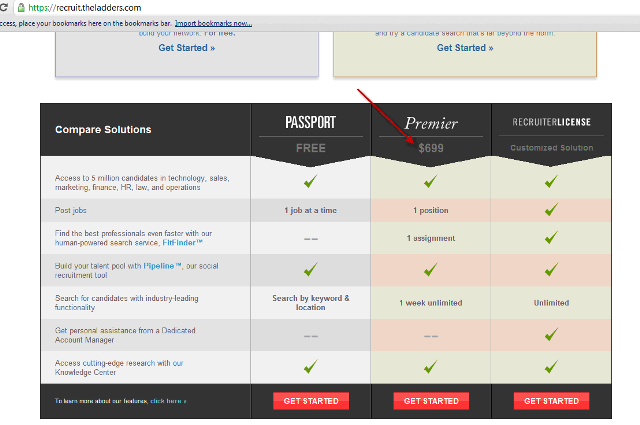

Speak Your Mind
Tell us what you're thinking...
and oh, if you want a pic to show with your comment, go get a gravatar!
You must be logged in to post a comment.